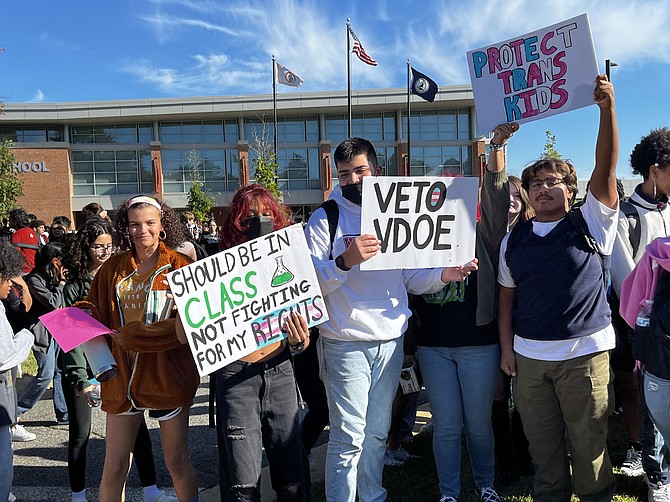Students at Herndon High School and others protest the Youngkin administration’s revised ‘Model Policies’ on trans students.
07-26-23-FCPS Responds to State Policies for Trans Students; WED- July 26, 12:54 edit by Mercia
On Tuesday, July 18, the Department of Education of Virginia Gov. Glenn Youngkin published the final 2023 Model Policies, which addresses transgender students attending public elementary and secondary schools throughout the Commonwealth. That includes students attending Fairfax County Public Schools. The Code of Virginia § 22.1-23.3 mandates the Department to adopt model policies that address the treatment of transgender students in public schools and make them available to school boards to adopt or adapt.
The July 18 release from the Virginia Department of Education summarized: "The 2021 Model Policies purposefully kept parents in the dark about their child’s health and wellbeing at school; the 2023 Model Policies restore parental rights in decision-making about their child’s identity."
According to a statement in the policies, "Parents are in the best position to collaborate with their children's health care providers to decide what names, nicknames, and/or pronouns, if any, teachers and school staff should use for their child, whether their child participates in any counseling or social transition at school that encourages a gender that differs from their child's sex, or whether their child expresses a gender that differs from their child's sex." The policies also advise: “Students will now use bathrooms corresponding to their biological sex, except to the extent the federal law requires. The same will be in place for sex-segregated sports and school programs.”
On July 18, when the department released the final model policies, most Virginia public schools were closed for summer vacation, preventing the kind of protests that occurred last fall. The policies, albeit just recommendations and not mandates, catapulted students, parents, staff, and school divisions, like FCPS, into confusion.
Michelle Reid, superintendent of Fairfax County Public Schools, wrote the day after the policies were released in her online message, "I understand the concerns that our students, staff, families, and community members may have about what this change of direction by the state may mean for our school division, particularly for our LGBTQIA+ community."
The VDOE Agency Response to its Comment Forum, July 18, 2023, says that the 2023 Model Policies considered the over 70,000 comments submitted to the Department during its public comment period. Page after page shows the majority of commenters opposing the new Youngkin model policy. Comments can be viewed on the Virginia Regulatory Town Hall site at https://townhall.virginia.gov/l/comments.cfm?GDocForumID=1953.
The previous, student-centered VDOE 2021 Model Policies, adopted on March 4, 2021 during Gov. Ralph Northam's (D) administration considered the treatment of transgender students in public elementary and secondary schools "in accordance with evidence-based best practices."
Reid said in her message, "We believe our current FCPS policies are consistent with federal and state anti-discrimination laws."
Fairfax County Public Schools has not changed its policy since the school board incorporated many elements of the VDOE 2021 policy to support transgender and binary students. The Fairfax County School Board did not heed VDOE’s 2022 Model Policies.
Reid added, "I want to be clear that FCPS remains committed to an inclusive and affirming learning environment for each and every student and staff member, including those who are transgender or gender expansive. Our schools will continue to be safe, welcoming, and respectful learning spaces."
Twelve anti-trans bills were defeated in the 2023 General Assembly, according to the ACLU of Virginia in "Virginia Department of Education Ignores Public Opposition and Greenlights Anti-LBGTQ Student Policies." Portions of the model policies attempt to do what the bills failed to do when they were defeated: "(1) Deny youth access to mental health services for fear of being forcibly outed; and (2) Deny them opportunities to participate in school athletics that align with their gender identity, which is in conflict with Virginia High School League policy and federal law."
Student Bas Rawat of Fairfax disagrees with the revised 2023 policy that emphasizes parents’ rights. A second-year George Mason student, Rawat, who uses they/he pronouns, said on July 24 that If he had to go to a school under the 2023 policies, his "overall mental health would've tanked."
"I would've dreaded coming to school every day, knowing that school wasn't truly a safe space. … I never would have been able to come out. My parents didn't agree with my name change or pronouns at all. I would've had to go to school every day, deadnamed and misgendered constantly... The school could've told my parents, which would've gotten me in trouble," Rawat said.
Retired FCPS teacher and advocate Robert Rigby said on Monday, July 24, "Youngkin’s ’Don’t be Trans’ policy makes being a parent or caregiver of LGBTQIA+ children really difficult in Virginia; it makes the lives of transgender students unlivable. Many families are preparing to leave Virginia before the new school year starts. Even students in school systems that don’t adopt the policy will be traumatized for decades."
The ACLU Virginia says the 2023 Model Policies: Prohibit school districts from safeguarding children from forced "outing" to their parents; Limit student access to gender-inclusive toilets; Erect barriers for trans and nonbinary pupils accessing counseling; Calling students by their affirming names and pronouns requires written parental consent; Allow teachers and staff, depending on their beliefs, to ignore parents' written instructions and misname and misgender students in school; Create facilities and sports policies that bar students from accessing and participating in activities consistent with their gender identities.
